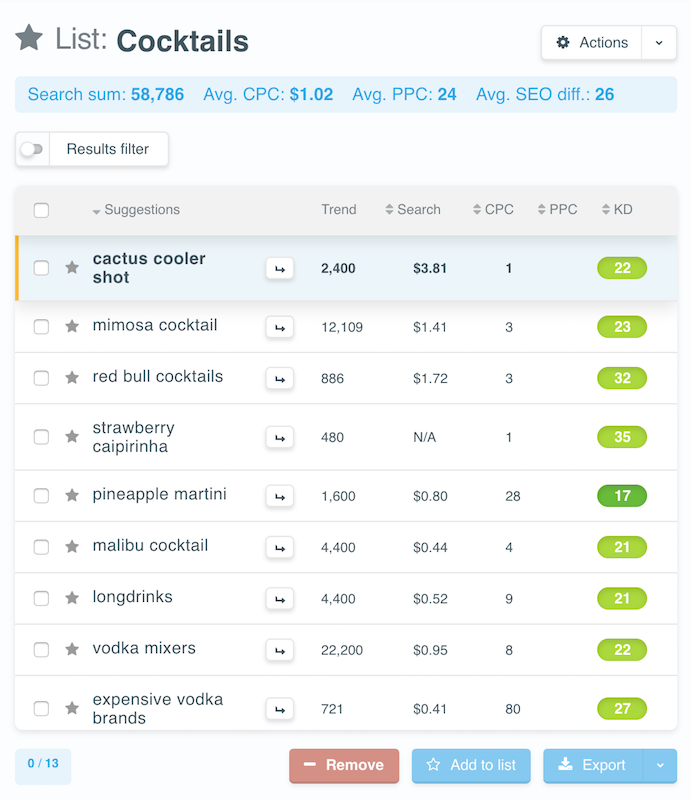
12 Mar How To Find Your Niche as a Blogger
Finding your niche is an important early step for fledgeling bloggers. There are tons of blogs out there and it’s all too easy to get lost in the sea of food bloggers trying to share their love of cooking just like you. Maybe you started blogging just for fun and you’ve been posting anything and everything under the sun. For those looking to really invest in their blog, though, having a well-defined niche is essential.
Why commit to a blogging niche?
There are several reasons this is important: building an audience, establishing good SEO, and working with brands are a few of the main considerations. Let’s break this down.
Building an Audience
 As you establish yourself as an expert in a specific niche, readers learn to trust you and keep coming back to you. For example, if you have a blog all about slow cooking, a reader that loves slow cooking will remember your site and keep coming back to it. If you have a blog focused on Lebanese food, members of that community will see your site as a reference and keep coming back.
As you establish yourself as an expert in a specific niche, readers learn to trust you and keep coming back to you. For example, if you have a blog all about slow cooking, a reader that loves slow cooking will remember your site and keep coming back to it. If you have a blog focused on Lebanese food, members of that community will see your site as a reference and keep coming back.
Regardless of how you attract users, you need to give visitors a reason to stay a while, and to come back over and over again. Having a specific niche allows you you to keep users around, especially when they can easily find related content that keeps them exploring your site.
Establishing Good SEO
A well-defined niche works wonders for SEO. As you continue to create content around a specific topic, search engines will recognize the focus of your blog. Ranking for keywords becomes easier because you may easily incorporate keywords into your content. You may have your keyword as part of the URL. For example, a site named easyvegan.com will have an advantage when it comes to ranking any content on the site for vegan-related keywords. Plus, as you create new content, it will be easier to create relevant internal links to new posts from older ones.

Working with Brands
If you want your blog to be profitable, you’re going to want to be able to work with brands. Brands are more likely to work with people who are connecting them with a particular niche audience they want to reach. They are also more likely to work with those with a high degree of relevancy to the product type (e.g. spice rubs for a grilling blogger). This relevancy lends authenticity and authority to a blogger’s recommendation of the product. In other words, brands typically aren’t likely to get excited about working with bloggers who don’t have a particular focus because it’s not clear how these bloggers could help those brands achieve their marketing goals.
On The Topic of Limitations
If committing to a niche seems limiting to you, remember that you can always start narrow and then broaden your horizons as your blog grows. Your niche doesn’t have to box you in, at least not forever. As explained above, picking a niche is really about giving you wings, not stifling your creativity.
How To Pick The Right Niche For You
So what kinds of considerations should go into defining your niche? Some of it’s personal, some of it’s technical, and all of it is worth thinking about.
What are your passions?
Let’s start with affairs of the heart. What do you love? What do you want to share with the world? What do you enjoy writing about (and what do you not enjoy writing about)? At the end of the day, you want to be proud of the content you create, so finding your niche starts, first and foremost, with a little soul searching. What kinds of blogs do you love and why? What kinds don’t you love and why? What kind of content would you enjoy and be proud to put out into the world?
Maybe you’ve been struggling to find quick-and-easy gluten-free recipes and you’d love to help others who are struggling in the same way. Or maybe Louisiana creole food is near and dear to your heart and you want to show the world what authentic Louisiana creole looks like. Maybe your passion is teaching just-moved-out college students how to cook real food. Find something small that gives you the drive to experiment, inform, share, expose, promote, or otherwise communicate to others and use that as your starting point.
Is your niche the right size?
This question can be a little trickier to answer, but it’s an important one. It’s easy to pick a niche that’s too big—one that doesn’t differentiate you in any way and gives you a miles long list of competitors. It’s also quite possible to pick one that’s too small—one so idiosyncratic that it doesn’t appeal to a sizable audience.
So how do you select a niche that’s the right size? If you’re starting with a wide focus like “food blogging,” try finding your niche within a niche. “Food blogging” is way too big to be a true “niche,” so start by narrowing it down to a particular style of cuisine, cooking strategy, or cooking lifestyle. For example, maybe what you’re really passionate about is mixology, so your niche might be “Cocktails.” But is that small enough? Let’s go to the next tip and find out….
Keyword Research
Now that we’ve narrowed it a little, it’s worth trying out a few tools that help you find out whether your niche is the right size yet. You need to do some keyword research to see how many people are searching for the keywords related to your niche.
For example, let’s look at keywords related to cocktails as a niche. You don’t want too many competitors to contend with, but you do want there to be at least a few people already working within that niche. Google AdWords is a popular keyword research tool for people with businesses; the AdWords Keyword Planner tool can help you find out how many people search for a given keyword per month. It can also show you how much competition there is to place ads associated with that keyword.
There are also tools like Keyword Finder that do similar work. They limit your searches unless you pay, but it is very affordable; plus, you can always just pay for one month and then cancel.
You want to find keywords that are less competitive, but still have search volume. So typing “cocktails” into kwfinder, we can start to see some keywords that are less competitive. After a few keyword searches, we can quickly narrow down a list of keywords worth going after.

Keyword finder looks at the top 10 results of a keyword to determine its Keyword Difficulty (KD). You can see all the terms above are not extremely competitive. So if you’re starting a blog about cocktails, this list would be a great way to determine what niche within cocktails you want to start with. For example, you can create a site focused on martinis, if you are a fan of vodka. It will be much easier to see results starting with something very specific and branching out from there.
Content Potential
There’s one other obvious consideration when it comes to choosing the size of your niche, and that’s how much content it can support before you’re repeating yourself. Make sure you can think of at least 50 ideas for blog posts related to your niche before you get too committed to it. If you’re having trouble brainstorming, the same keyword research tools, or a simple Google search might help give you ideas. Another excellent resource is a site called Answer The Public, which breaks down searches for a particular keyword into common questions, prepositions, and comparisons people are searching for.
Is your niche profitable?
Last but certainly not least, you need to consider how profitable your niche is. Can you think of brands that might like to advertise within that niche? Do any of those brands sell high-ticket goods or services? How many competitors do advertisers have to choose from already within that niche? Does this niche require considerable financial investment on your part?
The same keyword research tools can help determine the profitability of your chosen niche. Pay attention the the CPC, or Cost Per Click, of results you find. The CPC indicates how much money advertisers are willing to pay to attract new customers that are consuming content within that niche. Look at other blogs in that niche and see if they have any sponsored posts or affiliate links that show ways they are monetizing.
Closing Thoughts
Feeling overwhelmed? There’s a lot to think about, but don’t get hung up on everything at once. It might take some time to find the right niche for you, and that’s okay! You don’t have to have it all figured out right away. In fact, with every new project, a few mistakes, hiccups, or slow-downs are inevitable. Don’t be afraid to try things and fail a little bit. Mistakes can be corrected, and it’s all part of the process.
If you don’t have a specific niche figured out yet, don’t let that stop you from blogging. Create a free Blogger site that you can redirect to your site once you have figured out your niche.
Looking for more guidance when it comes to creating a food blog? Check out our article on How To Start A Food Blog.



Barakha Rao
Posted at 02:25h, 08 SeptemberIn the early days of content writing, the online publishers were often told to be very specific – define a niche on very restricted topics (e.g. “web hosting”) and become the master in that selective narrow field. Now the time has changed. Thanks for this page. For me, the ‘Starting a Blog’ helped me find my niche pretty quickly. I would suggest that niche.
Even if you are publishing for a long time, I think it is good to stay in such a niche once in a while, to discover whether your interests have changed or increased. I must say that the knowledge and growth that comes from doing will be far greater than the rewards of just planning.